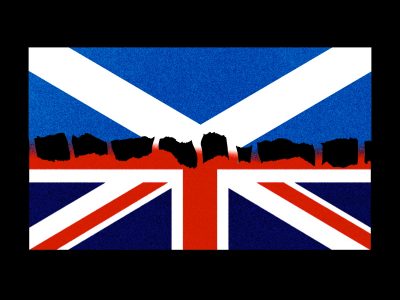Scotland may soon have a chance to finally free themselves of its English chains.
Scots voted to keep themselves in the United Kingdom in a 2014 referendum, but the situation has since changed. The United Kingdom, of which Scotland is unfortunately a member, voted to leave the European Union in 2016 by a 52-48 margin. On that same vote, Scots voted 62-38 to remain in the EU.

The importance of the Brexit vote cannot be understated. The decision to leave the EU was a highly contentious issue with far-reaching implications. The difference between England and Scotland’s voting on the matter created a wide gulf between them.
If Scots had the right to self-determination, they would not have left the EU. But Scots do not have that right because they are still ruled by a government primarily composed of Englishmen.
Why should Scotland have to remain in the U.K. and thus be forcibly ejected from the EU? Why must Scots continue to follow the edicts of Westminster?
The Scottish National Party, now the largest political party in Scotland, supports independence, as do a growing number of Scots, according to many polls conducted since June 2020.
But regardless of what the polls say, Scotland has a distinct identity, politics and set of issues, all of which would be best governed by Scots. Eighty to 85 percent of all age groups “feel strongly Scottish,” according to the BBC. A strong sense of national identity is part of what binds nations together.
I feel very strongly American, and I would be infuriated if I had to follow rules made primarily by a country I do not identify with. Scots should not have to put up with that same kind of frustration.
Additionally, the Scottish government put out a report that Scotland as a country is more than just its history and institutions, “it is also about shared values and aspirations.”

From the party affiliation of Scottish members of U.K. Parliament, there are clear divisions between Scottish values and the rest of the U.K.’s values, especially England’s.
In the 2019 U.K. general election, 47 of the 59 of members of parliament Scotland sent to the U.K. were members of the Scottish National Party, which describes itself as “centre left and social democratic.” That center-left ideology contrasts with the predominant right-leaning party in England: the Conservative Party.
On the issue of taxation, the Scottish National Party supports, and has delivered on, progressive taxation in Scotland. However, the Conservative Party — the current ruling party — touts Boris Johnson’s guarantee that “we will not raise the rate of income tax, VAT or National Insurance.”
Additionally, Scotland faces different problems compared to England. For example, Scotland has a drug death epidemic, with higher rates of drug deaths than any other country in the U.K. or the EU.
Currently, Scotland is not allowed to try more radical solutions to the drug crisis because Westminster controls the drug policy. If Scotland freed itself, they could determine their own drug policy and test innovative solutions to a frightening Scottish problem.
If a nation has a different set of problems, political ideology and national identity, why should that nation be governed by anyone but its residents?
The principle of self-government demands Scotland’s full freedom and independence. All who believe in self-government should at the very least support another vote for Scots to decide whether or not they want to leave the U.K.
But I would go one step further and say anybody who believes in self-government — the ideal on which the United States is built — should support Scottish independence outright.
Scots must be given another independence referendum and free themselves at last. Their time has come.





















































































































